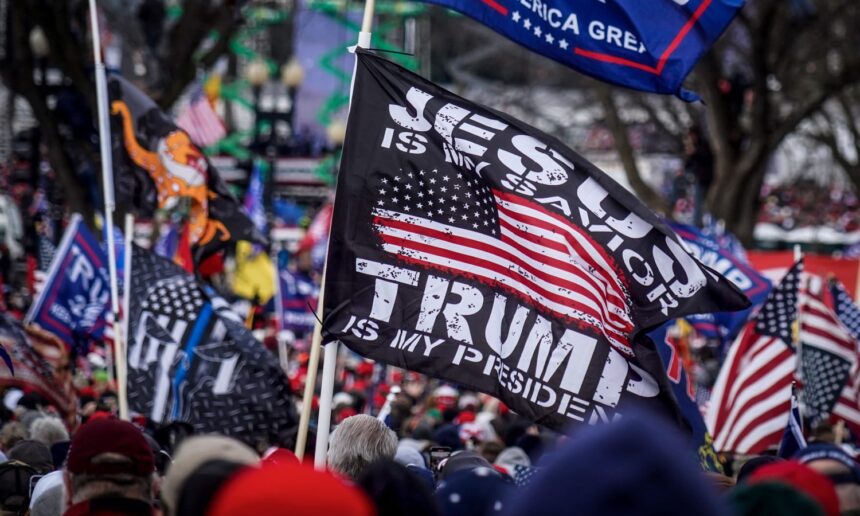(Image source: Selcuk Acar for Getty Images)
During an Iowa rally in late 2023, former president Donald Trump declared, “As soon as I get back in the Oval Office, I’ll also immediately end the war on Christians. I don’t know if you feel it. You have a war. There’s a war. . . Christians and Americans of faith are being persecuted and government has been weaponized against religion like never before.” Trump’s use of the language of war and persecution can ignite a group’s instinct for survival, defense, and retribution. It also fosters a need for a savior, someone who can safeguard the group’s interests.
Addressing the Turning Point Action Believers’ Summit several months later in July 2024, Trump encouraged the audience, “Get out and vote just this time. You won’t have to do it anymore. Four more years it will be fixed. It’ll be fine. You won’t have to vote anymore, my beautiful Christians. You’ve got to get out and vote. In four years, you don’t have to vote again, we’ll have it fixed so good you’re not going to have to vote.” This apparent pledge to abolish future elections was a classic example of Trump’s rhetoric—utilizing language to motivate his intended audience while maintaining enough ambiguity to avoid direct promises to restrict voting access and undermine American democracy.
Since his emergence onto the national political stage in 2015, commentators have pointed out numerous instances of authoritarianism in Trump’s speeches. In each case, Trump appeals directly to American Christians, offering privilege and power in exchange for their support, positioning himself as the sole leader willing to champion their cause. Trump consistently taps into the desire of many Americans to mold the United States into a distinctly “Christian” nation, tailored for individuals like them.
Years of research in the social sciences demonstrate a crucial link between Christian nationalism and authoritarianism. Individuals who espouse Christian nationalism are inclined to pursue authoritarian measures to secure their perceived rightful position at the top of the national hierarchy. Additionally, a strong correlation exists between Christian nationalism and a tolerance for violence and a weakening of democratic values. Therefore, when Trump employs Christian nationalist rhetoric, he is essentially preaching to a receptive audience ready to translate his words into action.
Understanding Christian Nationalism
Christian nationalism is a cultural framework that aims to merge a particularly conservative form of Christianity with various aspects of American civic and social life. It asserts that all levels of government should safeguard and uphold this cultural framework as central to the nation’s identity, determining who can engage in civic activities and fostering feelings of social inclusion.
An important aspect of Christian nationalism is the phrase “a particularly conservative expression of Christianity.” This signifies that the Christianity associated with Christian nationalism is a specific form—predominantly conservative both in theological and political outlook. It encompasses a blend of cultural elements alongside widely accepted Christian beliefs. These elements, often referred to as “cultural baggage,” are consistently present in surveys and studies examining Christian nationalism.
Traditionalist Social Arrangements
The first element of Christian nationalism involves a preference for a society structured according to traditionalist social arrangements and hierarchies. A well-functioning nation, according to this perspective, consists of complementary roles for men and women, with men in leadership positions and women in supporting roles, heterosexual couples, and families comprising a mother and father committed to procreation. Individuals and families embodying these ideals are believed to deserve easier access to civil rights and liberties. Those diverging from these ideals are often viewed as less than true Americans. LGBTQ individuals may encounter obstacles in adopting children, while unmarried, childless women may face criticism for deviating from societal norms. For many Christian nationalists, the United States is perceived as straying from these traditional arrangements, signifying a dangerous departure that could lead to divine retribution for the nation’s transgressions.
Strong Ethno-racial Boundaries
The second element of Christian nationalism centers on strict ethno-racial boundaries. The narratives and symbols within the framework of Christian nationalism portray the United States as a nation established by white, Anglo-Protestant men based on white, Anglo-Protestant values, designed for the benefit of contemporary white, Anglo-Protestant citizens by preserving their cultural identity and political leadership. This group is expected to remain core to the country’s identity and governance, with ethnic diversity perceived as a hindrance rather than a strength. These boundaries have been redrawn over time in American history; for instance, Catholics were once marginalized as non-white and un-American. Even in the 1960s, prominent white Christian Protestant figures like Billy Graham opposed the presidential candidacy of John F. Kennedy due to his Catholic faith. However, the rise of the Moral Majority in the 1970s led to collaboration between conservative Catholics and Protestants, resulting in conservative Catholics now holding a significant presence on the Supreme Court.
Hence, the “white” aspect in white Christian nationalism does not solely refer to skin color but symbolizes the greater access to power, privilege, wealth, and societal benefits that white Americans, as a collective, tend to possess. Non-white Americans can also embrace white Christian nationalism to perpetuate the values, beliefs, behaviors, and attitudes that reinforce the status quo benefiting white Americans. Individuals subscribing to Christian nationalism perceive discussions on racial inequality as an attack on the country’s principles of equal opportunity.
Populism and Conspiratorial Thinking
The third element of Christian nationalism involves an acceptance of populism and conspiratorial thinking. The populist notion that America is tailored for the common citizen allows room for individuals to embrace feelings of victimization, believing that certain “elites” are conspiring against them. This susceptibility to conspiratorial thinking is evident in the endorsement of theories like QAnon, the propagation of the “Big Lie,” and the dissemination of misinformation on scientific findings such as vaccinations.
Authoritarian Social Control
The final cultural element, crucial in the current context, is a comfort with authoritarian social control. Within the cultural framework of Christian nationalism, the United States is viewed as having a special covenant with the Christian God, making the nation exceptional compared to others. This exceptional status places certain demands on the United States from a divine perspective. Failure to meet these demands and uphold specific standards jeopardizes the nation’s relationship with God. Robert Jeffress, the senior pastor of First Baptist Dallas, encapsulates this viewpoint in his book America is a Christian Nation, where he highlights the nation’s departure from its biblical foundation due to shifts in societal values and governance. Jeffress emphasizes that the United States was predominantly founded by Christians aiming to establish a nation in alignment with God’s will, with its future success contingent on adherence to Christian principles.
To uphold these “Christian beliefs,” the country requires robust regulations and authoritative figures who, through the threat or use of violence, defend and enforce desired social hierarchies and ethno-racial boundaries. For instance, when justifying his support for Donald Trump in the 2016 election, Robert Jeffress expressed a preference for a strong, assertive leader over a passive one, underscoring the need for a leader who can protect the nation decisively. Similarly, self-professed Christian nationalist Stephen Wolfe advocates for more authoritarian measures to establish a “Christian” nation, proposing the installation of a “Christian prince” to implement a theocratic form of rule. This leader would wield authority to shape and lead the nation towards greatness.
How does a comfort with authoritarian social control manifest in everyday life in the United States? The primary outcomes, supported by substantial empirical evidence, are a propensity for political violence and a resistance to democratic values.
Authoritarian Social Control and Political Violence
In American Idolatry, I explore how violence forms a fundamental component of Christian nationalism alongside power and fear. Christian nationalism revolves around preserving privileged access to political power, enabling a group to act unhindered despite opposition. This privilege of power evokes a sense of fear and vulnerability, fueling a belief that external forces may seek to seize power. When confronted with this possibility, a group is more inclined to resort to violence to protect its position.
There is a distinct rationale behind this mindset. Conservative political and religious leaders often frame American politics as a battle between good and evil, urging American Christians to combat evil using any means necessary, even hinting at the use of violence. This sentiment is echoed by current Speaker of the House of Representatives, Mike Johnson, who asserted the need to confront a hostile culture, emphasizing the aggressive nature required to defend against perceived threats. This narrative of divine commandment to reclaim the nation prompts adherents to consider employing any means necessary, including violence, to fulfill their mission.
Individuals embracing Christian nationalism tend to endorse various forms of violence, including state-sanctioned violence. In The Flag and the Cross, authors Philip Gorski and Samuel Perry illustrate that individuals embracing Christian nationalism are more likely to support the use of any means necessary by authorities to maintain law and order; for instance, they may believe that the death penalty should be utilized more frequently. These individuals also exhibit a willingness to accept political violence if it aligns with their desired objectives.

(Image source: Patrick Semansky for Associated Press)
According to a 2023 report by the Public Religion Research Institute (PRRI), 40 percent of Christian nationalism adherents agreed that “Because things have gotten so far off track, true American patriots may have to resort to violence in order to save our country.” Over 50 percent of these individuals concurred that “there is a storm coming soon that will sweep away the elites in power and restore the rightful leaders.”
Recent research by political scientists Miles Armaly, David Buckley, and Adam Enders reveals that the relationship between Christian nationalism and support for political violence is contingent on specific factors. Not all individuals embracing Christian nationalism actively seek violence; rather, their inclination towards political violence is triggered when they receive cues from trusted political figures emphasizing their perceived victimhood, the necessity to defend racial boundaries, and the call to resist “nefarious elites” plotting their demise. The insular environments where individuals immersed in Christian nationalism thrive on conspiratorial thinking further expose them to these cues. They have internalized the belief that their religious rights are under threat, their Bibles are at risk of confiscation, and they may become oppressed once they are outnumbered racially and religiously. For some, their entire way of life and America’s covenantal relationship with the Christian God are at stake.
This fear helps elucidate violent events like the January 6th insurrection. Participants in the Capitol breach received cues from leaders within conspiratorial echo chambers, activating latent Christian nationalism and a comfort with violence to pursue their political objectives. This underscores the intertwined desire to weaken democratic practices in alignment with a readiness for political violence.
Authoritarian Social Control and Weakening Democratic Values
Closely linked to comfort with political violence is the support for undermining democratic values to secure political outcomes. This erosion of democratic principles poses a subtler yet more insidious threat to a pluralistic democratic system than outright political violence. In essence, if one side can ensure electoral outcomes by restricting access to the vote, there may be no need for acts of violence, aligning with the strategies of authoritarian leaders.
Christian nationalism, authoritarian social control, and subversion of democratic norms have a historical presence in the United States. Influential figures in the Religious Right have not only focused on mobilizing the “right” voters, such as conservative, white, evangelical Christians but also on limiting access to voting for those deemed unsuitable. Paul Weyrich, a prominent figure in the Religious Right, articulated this viewpoint at a convention in 1980, highlighting the leverage gained in elections as the voting populace decreases.
Individuals embracing Christian nationalism today echo this sentiment, as evidenced in surveys showing their inclination to restrict democratic processes. For instance, expert testimony submitted to the U.S. House of Representatives’ January 6th committee by Samuel Perry and myself demonstrates that individuals embracing Christian nationalism are more likely to agree with sentiments like “We make it too easy to vote,” “I would support a law requiring Americans to pass a basic civics test to vote,” and “I would support a law revoking the voting rights for certain criminal offenders for life.” These individuals also tend to regard voting as a “privilege” rather than a right, a crucial distinction as privileges are subject to limitation or revocation. Those failing to align with the criteria for being a “true” American are at risk of being excluded from the democratic process.
As the 2024 election approaches, it becomes imperative to grasp the cultural and political implications of Christian nationalism. Rooted in the belief that only select Americans are entitled to full citizenship rights, Christian nationalism is amenable to weakening democratic values and endorsing political violence to achieve desired outcomes. This stance places its adherents in direct opposition to a pluralistic democratic society. Political leaders with authoritarian tendencies, like Donald Trump, who embrace Christian nationalism, find ample support among millions of Americans willing to accept authoritarianism in exchange for promised political privileges and power, all in the name of reclaiming America for God.
Andrew Whitehead is a Professor of Sociology at Indiana University Indianapolis. He is the author of two award-winning books on Christian nationalism, American Idolatry: How Christian Nationalism Betrays the Gospel and Threatens the Church and Source link






